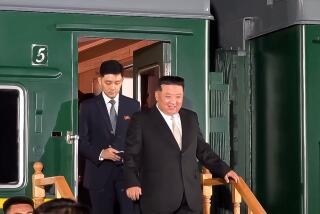Gorbachev Gives Bush Assurance on Arms Control
- Share via
MOSCOW — Soviet President Mikhail S. Gorbachev told President Bush on Saturday that the arms control disagreements that have delayed a superpower summit can be easily solved so the two leaders can meet soon in Moscow, the official news agency Tass reported.
In an extended telephone conversation, Gorbachev said his commitment to U.S.-Soviet relations is as “unchangeable as his choice for a fundamental democratic transformation of the Soviet state,” Tass said.
Although the two leaders previously declared their intention to meet in the Soviet capital in the first half of this year, differences over an agreement to reduce conventional military forces in Europe and a START nuclear weapons accord have delayed the summit.
But Gorbachev told Bush that these differences can be overcome in order to concentrate on improving relations between the superpowers, Tass said.
The chief of staff of the Soviet armed forces, Gen. Mikhail Moiseyev, is scheduled to visit Washington this week, and Gorbachev hopes those talks will solve the remaining problems on the conventional weapons issue, Tass said.
“In connection with the problem of the treaty on conventional arms, the president (Gorbachev) expressed hope that a visit in the next few days by a responsible Soviet representative will provide a chance to find an acceptable solution,” Tass reported. “The remaining problems on strategic armaments will create no obstacles.”
In Washington, White House spokesman Bill Harlow said Bush still would like a summit to be arranged “during the first half of this year.” But he added that Bush and Gorbachev had not agreed to set a date during their conversation, which lasted 45 minutes.
Harlow said Bush placed the call Saturday morning from the presidential retreat at Camp David, Md.
“It was a positive and wide-ranging discussion,” Harlow stated. “There was a particular emphasis on arms control and economic issues.”
U.S. officials said the main obstacle to the summit is still the conventional forces treaty, which both countries signed in Paris last November.
The treaty requires the nations of both the North Atlantic Treaty Organization and the now-defunct Warsaw Pact to destroy thousands of tanks, artillery pieces and aircraft until they reach a lower, equal level of weaponry.
But beginning last year, the Soviet Union reassigned about 5,400 pieces of equipment to “naval infantry” and strategic missile units, which are exempt from the treaty limits.
Western officials denounced the move as an attempt to evade the intent of the pact after it had already been signed.
In the past two months, both sides have offered compromise solutions and appear to be closing in on a deal. The Soviet Union has proposed that it should be allowed to keep about half the weapons. NATO responded with an offer to exempt 1,700 armored vehicles as long as they are used to defend Soviet nuclear weapons bases--a mission that, with civil disorder spreading in the Soviet Union, Western officials are willing to assist.
Gorbachev and Bush last met in Helsinki in September, 1990, primarily to discuss Iraq’s invasion of Kuwait. Bush hosted Gorbachev at a formal summit in Washington in May and June last year.
But Bush has not visited Moscow since assuming the presidency in January, 1989. A Moscow summit originally was planned for February, then was postponed because of the outbreak of the Persian Gulf War and a crackdown by Soviet troops in the Baltics.
During their telephone conversation, Gorbachev appeared to stress that U.S.-Soviet relations have remained one of his top priorities and that his domestic policies should not worry Washington.
“The importance of this conversation was first of all to confirm mutual adherence to the course toward improving Soviet-American relations,” Tass said.
Gorbachev’s plug for a superpower summit came at a time when he has been under fire from abroad for strict new policies at home.
The Soviet president defended his domestic policies, such as the “anti-crisis program,” which has been criticized as hard-line by liberals in the Soviet Union because it bans strikes and protests, and other disputed measures.
“It is only possible to evaluate it correctly, as well as some forced economic measures by the Soviet government, if one takes into account concrete realities in our country at this most decisive stage of perestroika, “ Gorbachev emphasized, according to Tass.
Gorbachev also accepted Bush’s offer to send a high-ranking delegation to Moscow next week to assess the Soviet Union’s food needs. Soviet officials have repeatedly asked for foreign aid to help them make it through a difficult transition from a planned economy to a market economy.
The Soviet Union has requested $1.4 billion in credits to purchase American grain, but the United States has not yet replied.
“No decision has been made on that issue,” Harlow said. “We’re hopeful that when this team of experts reports back, we will know more about the prospects.”
The advisory team, led by Undersecretary of Agriculture Richard Crowder, is to leave for the Soviet Union on Friday, Harlow said. The group plans to focus on the problems of the Soviet food distribution system, he said.
The U.S. Commodities Credit Corp. has held up further credits for the Soviet Union, officially because of fears about Moscow’s situation.
But a U.S. official said Saturday, “The issue is really helping them with their food system, whether the aid can be used effectively, not so much their credit.”
The Soviet Union has lost as much as half of its own food production because of poor transportation and distribution.
Shogren reported from Moscow and McManus reported from Washington.
More to Read
Sign up for Essential California
The most important California stories and recommendations in your inbox every morning.
You may occasionally receive promotional content from the Los Angeles Times.














